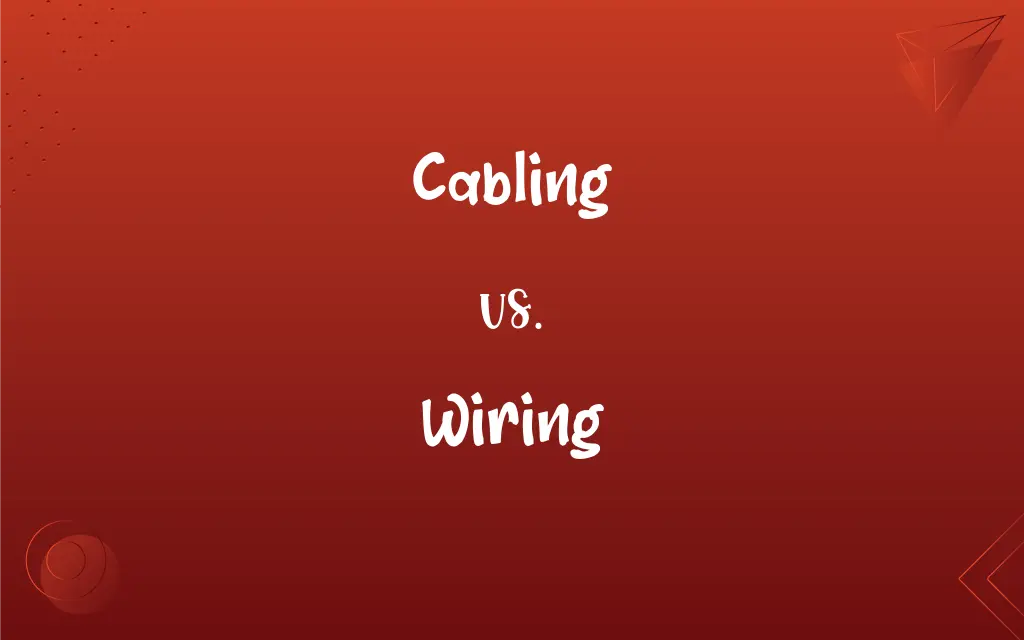Cabling vs. Wiring: What's the Difference?
Edited by Aimie Carlson || By Harlon Moss || Published on January 4, 2024
Cabling involves the use of insulated wires bundled together for telecommunications or data transmission; wiring refers to electrical conductors installed to distribute power.

Key Differences
Cabling is the process of arranging multiple insulated wires within a single sheath, mainly used for data and telecommunication transmission. Wiring, on the other hand, involves the installation of individual electrical conductors to transmit electrical power.
Cabling often uses materials like copper or fiber optics, tailored for efficient data or signal transmission. Wiring typically involves copper or aluminum conductors, designed to safely carry electrical current.
Cabling is essential in networking, telecommunication systems, and computer data transfer. Wiring is fundamental in electrical power distribution within buildings, machinery, and electronic devices.
Cabling requires careful planning for data integrity and minimal signal interference, often using twisted or shielded designs. Wiring focuses on electrical safety, load capacity, and compliance with electrical codes.
Cabling systems may need updates to accommodate higher data speeds or new technologies like fiber optics. Electrical wiring systems require maintenance for safety and efficiency, with upgrades often driven by changes in power demand or regulations.
ADVERTISEMENT
Comparison Chart
Primary Use
Data and telecommunication transmission
Electrical power distribution
Materials Used
Copper, fiber optics
Copper, aluminum
Key Applications
Networking, internet, telephony
Building electrical systems, machinery
Design Considerations
Signal integrity, interference minimization
Electrical safety, load capacity
Maintenance and Upgrades
Technology upgrades for higher speeds
Safety checks, capacity expansion
ADVERTISEMENT
Cabling and Wiring Definitions
Cabling
Bundling of multiple wires for data or signal transmission.
The office's network performance improved after upgrading its cabling system.
Wiring
Electrical conductors installed for power distribution.
The electrician checked the building's wiring for any safety hazards.
Cabling
Installation of cables for networking and communication.
The new building's cabling was designed to support advanced telecommunication systems.
Wiring
Arrangement of electrical wires in circuits.
The technician is troubleshooting the machinery's wiring to locate the fault.
Cabling
System of cables used for transmitting data.
Upgrading the cabling can significantly increase data transmission speeds.
Wiring
Installation process of electrical systems in buildings.
The new construction project requires extensive wiring for its electrical needs.
Cabling
Use of fiber optics or copper wires in telecommunications.
High-speed internet is often delivered through fiber optic cabling.
Wiring
System of wires used for electrical power and control.
Up-to-date wiring is essential for meeting modern energy demands.
Cabling
The arrangement of cables within a protective sheath.
Proper cabling is essential for minimizing signal interference in data centers.
Wiring
Use of insulated wires for electrical connections.
Proper wiring is crucial for the safe operation of home appliances.
Cabling
A collection of cables.
We have to redo all this cabling for the network and this time remember which wire goes where.
Wiring
The act of attaching, connecting, or installing electric wires.
Cabling
(architecture) The decoration of a fluted shaft of a column or of a pilaster with reeds, or rounded mouldings, which seem to be laid in the hollows of the fluting.
Wiring
A system of electric wires.
Cabling
Present participle of cable
Wiring
A part of the body's physiology or neurology that determines or controls something, such as a capability or disorder
"Evolution, having made the basic computational units of language innate, may have seen no need to replace every bit of learned information with innate wiring" (Steven Pinker).
Cabling
The decoration of a fluted shaft of a column or of a pilaster with reeds, or rounded moldings, which seem to be laid in the hollows of the fluting. These are limited in length to about one third of the height of the shaft.
Wiring
Present participle of wire
Wiring
A mass of electric wires.
Wiring
The act of one that wires anything.
Wiring
The wires or conductors employed in any system in which electric voltages or current are transmitted between components.
Wiring
A circuit of wires for the distribution of electricity
Wiring
The work of installing the wires for an electrical system or device
FAQs
What is cabling?
Arranging multiple wires within a single sheath, mainly for data transmission.
What is wiring?
Installation of electrical conductors for power distribution.
What materials are used in cabling?
Commonly copper or fiber optics.
What materials are common in wiring?
Typically copper or aluminum.
How are cabling and wiring different in application?
Cabling is for data and telecommunication; wiring is for electrical power.
What is an example of cabling use?
In computer networks and internet connections.
Where is wiring commonly used?
In homes, offices, and industrial settings for power distribution.
Are cabling and wiring interchangeable terms?
No, they have different purposes and design considerations.
Can cabling be used for power transmission?
It's mainly for data, not ideal for high-power transmission.
Is grounding important in wiring?
Yes, for safety in electrical systems.
What risks come with outdated wiring in a house?
Risks include electrical fires and system failures.
How often should cabling systems be upgraded?
Depending on technological advancements and data demands.
Does cabling require grounding?
Not usually, as it's for low-voltage data transmission.
Can cabling affect internet speed?
Yes, quality cabling can improve speed and reliability.
Is wiring suitable for data transmission?
It's primarily for power, not data.
What are the safety considerations in cabling?
Ensuring data integrity and minimizing signal interference.
What safety aspects are crucial in wiring?
Compliance with electrical codes and ensuring proper load capacity.
When should wiring systems be inspected or upgraded?
Regularly, for safety and to meet changing power needs.
Does the quality of wiring affect power efficiency?
Yes, good wiring ensures efficient and safe power distribution.
What's the impact of poor cabling in an office?
It can lead to slow network speeds and data loss.
About Author
Written by
Harlon MossHarlon is a seasoned quality moderator and accomplished content writer for Difference Wiki. An alumnus of the prestigious University of California, he earned his degree in Computer Science. Leveraging his academic background, Harlon brings a meticulous and informed perspective to his work, ensuring content accuracy and excellence.
Edited by
Aimie CarlsonAimie Carlson, holding a master's degree in English literature, is a fervent English language enthusiast. She lends her writing talents to Difference Wiki, a prominent website that specializes in comparisons, offering readers insightful analyses that both captivate and inform.







































































